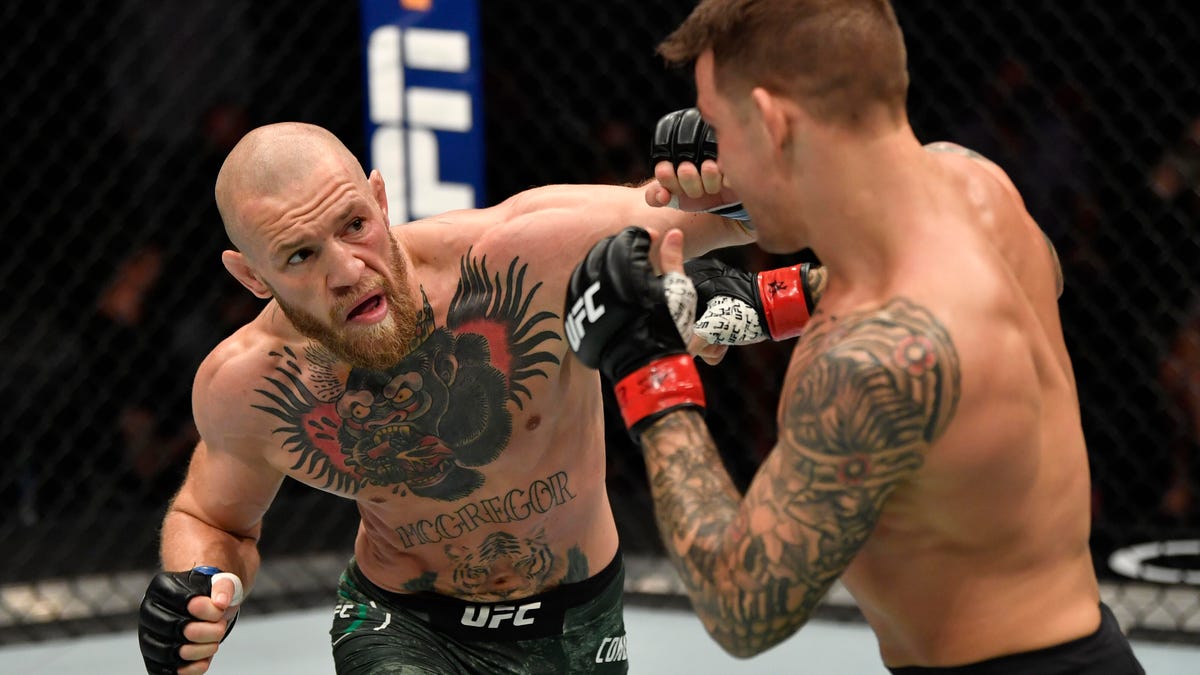 Why You Can Trust CNET
Why You Can Trust CNET Conor McGregor's staggering loss to Dustin Poirier: How much money did each make at UFC 264?
A major upset at UFC 264 turns the tables on the highest paid UFC fighter on the planet. What does that mean for the size of the purse?

Conor McGregor of Ireland punches Dustin Poirier in a lightweight fight during the UFC 257 event in January. The two met for a rematch July 10.
Round No. 3 in the Conor McGregor and Dustin Poirier saga has reached its conclusion in the T-Mobile Arena in Las Vegas, with McGregor suffering a loss thanks to a freak leg break in the dying seconds of the first round.
One big question: Just how much money did each athlete make from Saturday's fight?
A highly anticipated rematch like this was expected to make millions of dollars for the winner -- and even the loser. In 2021, McGregor made a disclosed $5 million for losing against Poirier. The Ultimate Fighting Championship company is at the center of a billion-dollar industry, so you'd expect the athletes to make a large sum of the money. But when it comes to fighters' take-home pay, the situation gets complicated fast. Here's what we know about the size of the purse and how much athletes actually get to keep.
A UFC spokesperson didn't follow up on a request for information after initially responding to a CNET inquiry.
How much did the winner -- and loser -- make in the McGregor vs. Poirier fight?
Similar to the UFC, the Nevada State Athletic commission doesn't officially release fighter purse information. However, The Sports Daily reported McGregor made $5,011,000 from the bout -- $5 million to show up and $11,000 as fight week incentive pay. Poirier, the winner by technical knockout, made $1,021,000 -- $1 million to show up and $21,000 fight week incentive pay, says The Sports Daily.
In the McGregor vs. Poirier fight at UFC 257 earlier this year, McGregor made a disclosed $5 million, despite losing. In the same fight, Poirier made $1 million. This doesn't include revenue from McGregor's share of pay-per-view earnings.
Forbes, which in May named McGregor the world's highest paid athlete over the past 12 months, estimated McGregor took home an additional $20 million in UFC 257.
Why didn't the winner of the McGregor vs. Poirier UFC fight automatically make more money?
Similar to boxing, the higher you are on the food chain, the more money you earn per fight, even if you lose. UFC's more popular fighters make more money depending on the revenue and audience they generate. McGregor is -- by leaps and bounds -- the UFC's greatest draw. The UFC's top five most-viewed PPV fights all featured McGregor in the main event. That's why, in McGregor's second fight with Poirier, McGregor made more money than his opponent, despite losing.
Likewise, in raising his profile, Poirier increased his earnings potential by defeating McGregor in a high-profile bout.
UFC fighters can also earn supplemental income from incentives throughout the night. Fight of the Night bonuses, Knockout of the Night, or Submission of the Night can all add to the athlete's total payout.
How much of the purse do UFC fighters get to keep?
Though the popularity of the UFC has been steadily increasing, the athletes aren't taking home a bigger percentage of the fight's total revenue. Former UFC athlete Cung Le, as well as other former UFC athletes, have sued the UFC, accusing it of operating as a monopoly.
According to several reports and an ongoing lawsuit, it was found that the athletes typically receive only 20% of the gross revenue the UFC brings in. This number is low compared with other professional sports. Major leagues such as the NFL, NBA, MLB and NHL reportedly pay athletes closer to 50% of gross revenue.
McGregor is a special exception and earns considerably more than other UFC athletes. When Ronda Rosey earned her highest disclosed purse, it tied with McGregor's highest at the time, which was then $3 million. Since then, he's blown that number out of the water, and no other UFC fighter has seen close to the amount of money he has. To date, his biggest payout wasn't a UFC match but the boxing match in which he fought Floyd Mayweather. McGregor was guaranteed $30 million prior to the fight but ended up walking away with a reported $85 million, Forbes said. (Mayweather won on a technical knockout and bagged $275 million, Forbes reported.)
Where does the money for the UFC purse come from?
The money that funds the UFC comes from multiple sources. A large majority of these athletes are on contract with the UFC. Each time they fight, they're guaranteed to earn a specified sum. Even on contract, athletes can earn money from pay-per-view purchases, ticket sales, closed circuit, commercial, other "PPV Event" revenue, merchandising, licensing and sponsorships.
The UFC also holds TV contracts that at one time were worth an estimated $1 billion. When it comes to athletes disclosing their earnings from a fight, there isn't a specific distinction between what the UFC gives the athlete versus what the fighters earn from endorsements.
Why are there so many UFC fights in Las Vegas?
To the UFC and mixed martial arts fighters, Las Vegas is considered to be the "fight capital of the world." Thanks to Victory in Vegas, a 2001 UFC event, standout names have steadily returned to Vegas for sellout events. It helps that the UFC's headquarters is also located in Las Vegas.
"We're going to build our own hotel. We'll be completely self-sufficient," UFC President Dana White said in an interview with reporters in August about a 10-acre land purchase. The UFC purchased the land near its current headquarters to build a hotel for fighters and their teammates to host events.

